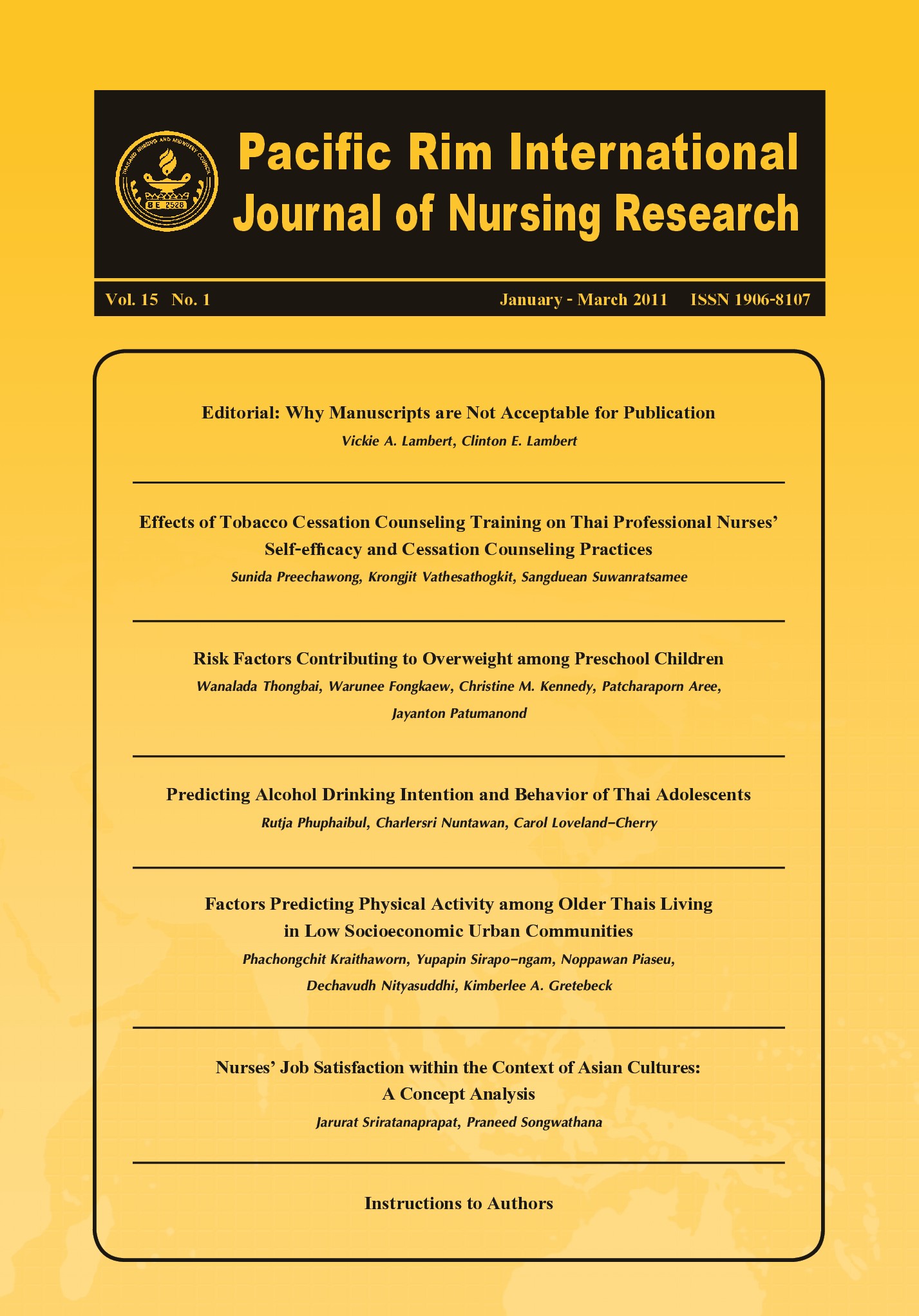Predicting Alcohol Drinking Intention and Behavior of Thai Adolescents
Keywords:
ความตั้งใจของวัยรุ่นในการดื่มแอลกอฮอล์, การดื่มแอลกอฮอล์, ทฤษฎีการวางแผนพฤติกรรมการดื่มแอลกอฮอล์, Adolescents’ intention to drink, Alcohol consumption, Theory of Planned Behavior, Drinking behaviorAbstract
บทคัดย่อ
การศึกษาครั้งนี้เป็นการศึกษาทัศนคติ บรรทัดฐานสังคม การรับรู้ความสามารถในการควบคุม ตนเอง ความตั้งใจและพฤติกรรมการดื่มแอลกอฮอล์ในกลุ่มตัวอย่างคือนักเรียนชั้นมัธยมศึกษาปีที่ 1-6 จำนวน 681 คนตามทฤษฎีการวางแผนพฤติกรรมของเอเซน ซึ่งทฤษฎีนี้ระบุว่าการที่บุคคลมีทัศนคติ ที่ดีเกี่ยวกับพฤติกรรม มีการรับรู้บรรทัดฐานสังคมว่าเป็นที่ยอมรับ และรับรู้ว่าตนมีความสามารถใน การควบคุมสูง เขาจะมีความตั้งใจที่จะมีพฤติกรรมนั้นสูง การศึกษาครั้งนี้เป็นการทดสอบความสามารถ ของทฤษฎีการวางแผนพฤติกรรมในการทำนายความตั้งใจและพฤติกรรมการดื่มแอลกอฮอล์ใน นักเรียนไทย รวมทั้งศึกษาอิทธิพลของความแตกต่างระหว่างเพศในการตั้งใจดื่ม แบ่งการเก็บข้อมูลเป็น 3 ระยะคือ การหาข้อมูลระยะแรก การศึกษานำร่อง และ การเก็บข้อมูลจริงโดยใช้แบบสอบถาม ข้อมูลทั่วไปและแบบสอบถามประเมินพฤติกรรมการดื่มแอลกอฮอล์และปัจจัยที่เกี่ยวข้อง มีการ วิเคราะห์ข้อมูลเชิงบรรยายและวิเคราะห์การถดถอยพหุคูณแบบลำดับขั้น ผลการศึกษาพบว่ากลุ่ม ตัวอย่างร้อยละ 14 ดื่มแอลกอฮอล์ในช่วง 1 เดือนที่ผ่านมา กลุ่มวัยรุ่นชายดื่มบ่อยกว่าวัยรุ่นหญิง โดยรวมเฉลี่ยดื่ม 3.8 ครั้งต่อเดือน ครั้งละ 4.7 แก้ว ผลการวิเคราะห์การถดถอยพหุคูณแบบลำดับขั้น พบว่าตัวแปรจากทฤษฎีการวางแผนพฤติกรรมได้แก่ความสามารถในการควบคุมตนเอง ทัศนคติ และ บรรทัดฐานสังคม สามารถร่วมกันทำนายความแปรปรวนของความตั้งใจที่จะดื่มแอลกอฮอล์ใน 30 วัน ข้างหน้าได้ร้อยละ 39.2 และ พบว่าความตั้งใจที่จะดื่มแอลกอฮอล์ใน 30 วันข้างหน้าร่วมกับการรับรู้ ความสามารถในการควบคุมตนเองทำนายความแปรปรวนของพฤติกรรมการดื่มแอลกอฮอล์ได้ ร้อยละ 9.2 และปัจจัยการรับรู้ในการควบคุมตนเองเป็นปัจจัยที่สำคัญและสามารถทำนายทั้งความตั้งใจและ พฤติกรรมการดื่มแอลกอฮอล์เชิงบวกได้มากที่สุด
คำสำคัญ : ความตั้งใจของวัยรุ่นในการดื่มแอลกอฮอล์, การดื่มแอลกอฮอล์, ทฤษฎีการวางแผนพฤติกรรมการดื่มแอลกอฮอล์
Abstract
This study, one of seven projects investigating health risk behaviors of Thai adolescents, sought to determine the ability of Ajzen’s Theory of Planned Behavior to predict alcohol drinking via examination of 7th - 9th grade Thai students’ attitudes, subjective norms, perceived behavioral controls and alcohol drinking intentions. In addition, the effect of gender differences on the students’ drinking intention was examined. Ajzen’s Theory of Planned Behavior postulates the more favorable the attitude and subjective norm, and the greater the perceived behavioral control, the stronger one’s intention will be to perform a given behavior. During a series of 3 data collection phases (elicitation study, pilot study and final data collection-actual study) data were obtained, through use of a researcher developed Demographic Data Questionnaire and an Alcohol Assessment Questionnaire, and analyzed by way of descriptive statistics and hierarchical multiple regression.
Results revealed 14% of the subjects drank alcohol within the previous month. In addition, the males reported more episodes (3.8 per month) of alcohol consumption and more intake consumption (4.7 glasses per episode) than the females. Regression analysis demonstrated the explanatory power of the Theory of Planned Behavior, in that perceived behavioral control predicted behavioral intention beyond attitude and subjective norm. The adolescents’ intention to drink alcohol and perceived behavioral control explained 9.2% of variance in their drinking behavior, while their perceived behavioral control had a significant positive effect on both intention to drink and drinking behavior. Combined, the subjects’ attitudes, subjective norm and perceived behavioral controls predicted 39.2 % of variance of their intention to drink alcohol within the next 30 days. In addition, the effect of gender on predicting intention was demonstrated.
Keywords : Adolescents’ intention to drink, Alcohol consumption, Theory of Planned Behavior, Drinking behavior
Downloads
How to Cite
Issue
Section
License
Copyright: The Pacific Rim International Journal of Nursing Research, Thailand Nursing & Midwifery Council has exclusive rights to publish, reproduce and distribute the manuscript and all contents therein.








.png)



